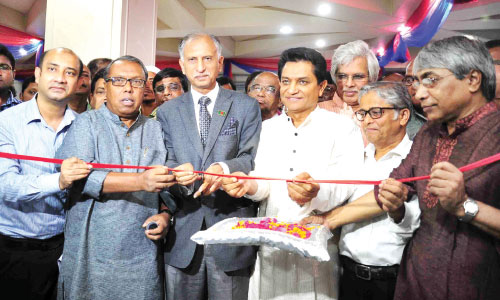The quality of education at University of Dhaka, which is celebrating its 95th founding anniversary today, has eroded drastically in recent decades, according to a number of studies, academics and some global rankings.
The views of the educationalists are mirrored in the Quacquarelli Symonds rankings of the universities around the world where it has fallen from 365th best university in 2005 to between 550 and 600 in 2010.
Current QS ranking published in January shows further fall in its ranking to 701st.
In Asia, the university ranks between 109 and 200.
The university began its journey on the first day of July in 1921, opening its doors to higher education in this part of the erstwhile British-India.
Since its establishment, the university has cradled most of the progressive and secular intellectual movements, including the historic language movement.
It enlightened not only its own students but the nation as a whole. Initially, the teachers and students worked real hard to build up an outstanding record of academic achievement, earning a reputation of ‘Oxford of the East.’ But, educationists agree that is a history.
They blame a general environment where both the teachers and the students are de-motivated, recruitment of teachers are done on political considerations, research works dwindle and laboratory facilities shrink. These factors are thought for the plunge in the standard of education.
‘We have to admit that the quality of education in Dhaka University dropped in the recent decades,’ Professor emeritus Serajul Islam Choudhury told New Age.
He said a serious lack of motivation on part of both the university teachers and students has helped in falling of quality of education.
‘The best qualified, meritorious people should be appointed as teachers in the university,’ said Serajul, also a noted writer and columnist adding, without the best faculty members, one would not get the best results. ‘A party-affiliated teacher fails to give proper guidance to the students in the classrooms,’ noted he.
Former DU vice-chancellor SMA Faiz told New Age that ‘in the global context, the quality of education in the university in general had deteriorated.’
He observed that the lack of quality research and the low number of quality journal publications had also attributed to this decay.
Another educationist, Professor Ajoy Roy, said, ‘The standard of our university education has nosedived with the appointment of poor quality lecturers where an aspiring teacher’s political line now dominates over most other criteria, during recruitment.’
Mojibur Rahman, an associate professor at the Institute of Education and Research at DU, also acknowledged the fact.
‘The quality of education sharply dropped as the university has failed to address its main purpose– creating ‘new knowledge.’
He also said that the teachers’ promotion should be based on their quality research and its publication.
All the educationists attributed the decline in the quality of research to a serious crisis of funds. They also condemned the politicised teacher recruitment system.
DU vice-chancellor AAMS Arefin Siddique, however, holds the opposing views.
He said in terms of quality and efficiency, DU graduates are of international standards and this is not reflected in the rankings.
‘I can assure you that the quality of education has improved a lot,’ Arefin told New Age.
He said that in the past, there were political recruitments but during his tenure, such recruitment has been shut.
‘We will make our research visible and digitise our publications as soon as possible,’ he added.
The university enrols every year more than 5,800 students on the basis of merit in the first-year bachelor courses.
At present, 37,064 students are enrolled and taught by some 1,885 teachers in 77 departments and 13 faculties, according to university website.
Source: New Age

